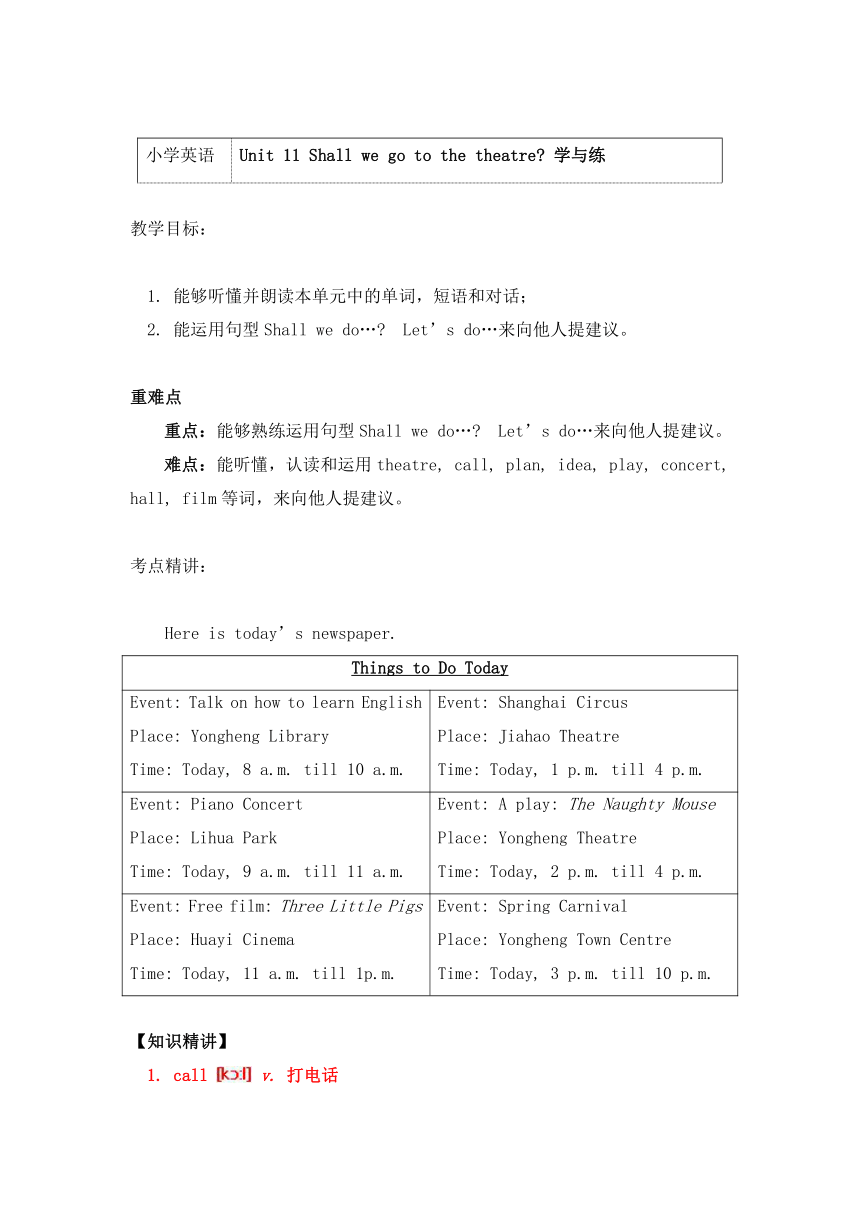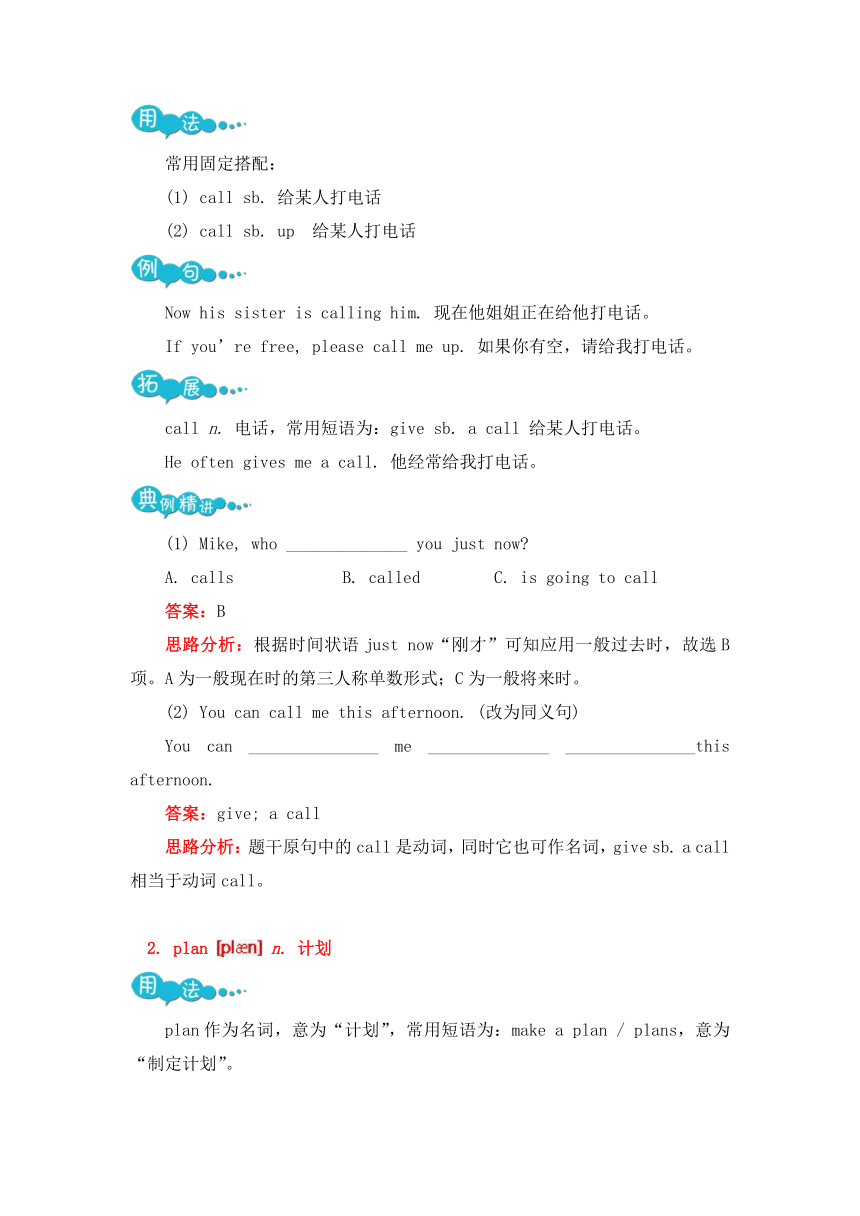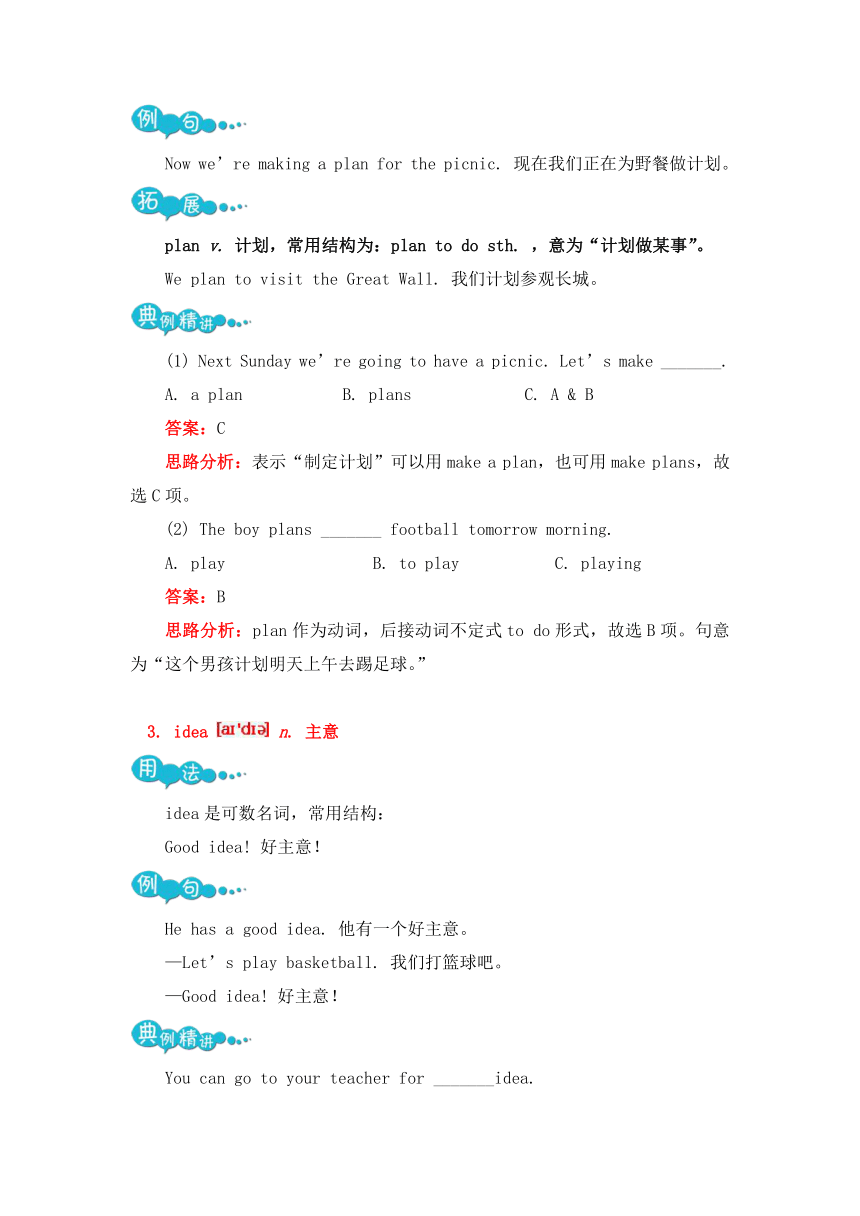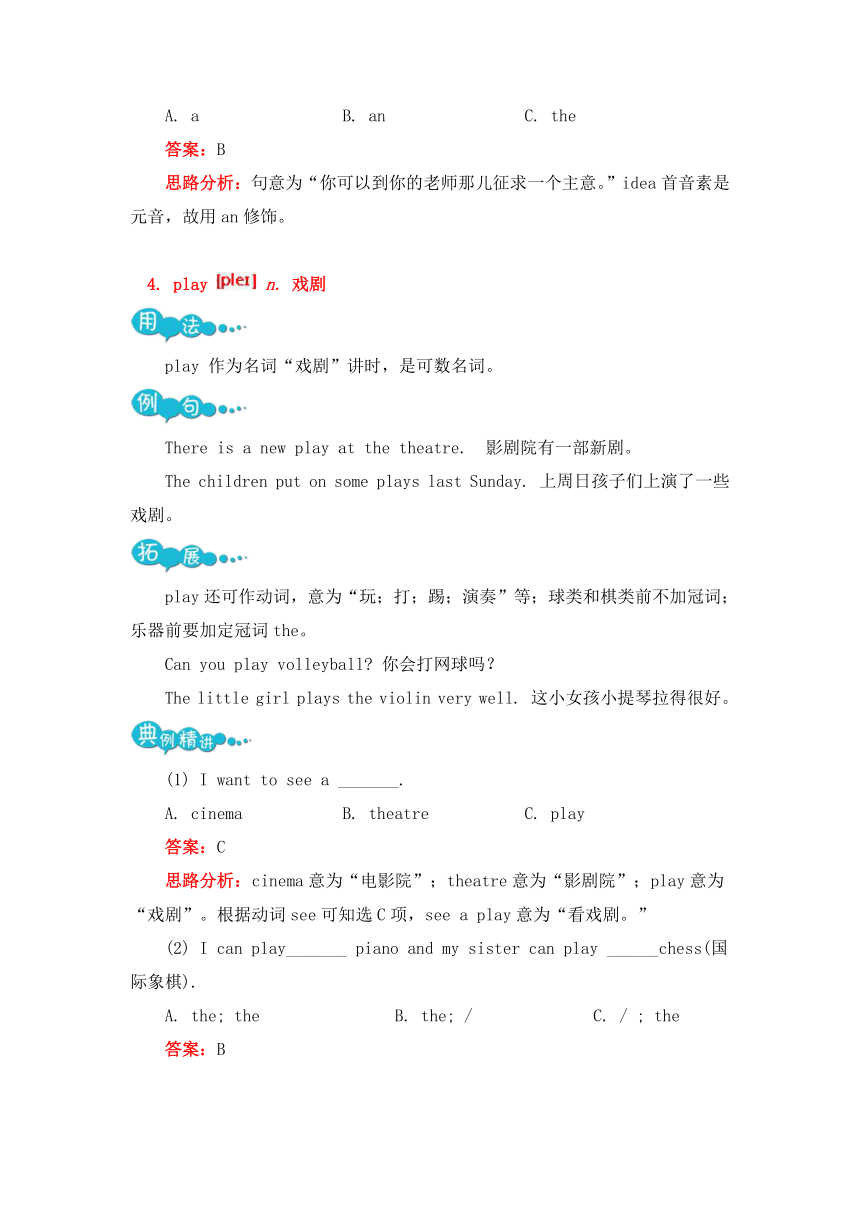Unit 11 Shall we go to the theatre 知识梳理-学与练(含答案)
文档属性
| 名称 | Unit 11 Shall we go to the theatre 知识梳理-学与练(含答案) |

|
|
| 格式 | doc | ||
| 文件大小 | 260.5KB | ||
| 资源类型 | 教案 | ||
| 版本资源 | 湘少版 | ||
| 科目 | 英语 | ||
| 更新时间 | 2023-08-11 00:00:00 | ||
图片预览




文档简介
小学英语 Unit 11 Shall we go to the theatre 学与练
教学目标:
1. 能够听懂并朗读本单元中的单词,短语和对话;
2. 能运用句型Shall we do… Let’s do…来向他人提建议。
重难点
重点:能够熟练运用句型Shall we do… Let’s do…来向他人提建议。
难点:能听懂,认读和运用theatre, call, plan, idea, play, concert, hall, film等词,来向他人提建议。
考点精讲:
Here is today’s newspaper.
Things to Do Today
Event: Talk on how to learn English Place: Yongheng LibraryTime: Today, 8 a.m. till 10 a.m. Event: Shanghai Circus Place: Jiahao TheatreTime: Today, 1 p.m. till 4 p.m.
Event: Piano Concert Place: Lihua ParkTime: Today, 9 a.m. till 11 a.m. Event: A play: The Naughty MousePlace: Yongheng TheatreTime: Today, 2 p.m. till 4 p.m.
Event: Free film: Three Little Pigs Place: Huayi CinemaTime: Today, 11 a.m. till 1p.m. Event: Spring Carnival Place: Yongheng Town CentreTime: Today, 3 p.m. till 10 p.m.
【知识精讲】
1. call v. 打电话
常用固定搭配:
(1) call sb. 给某人打电话
(2) call sb. up 给某人打电话
Now his sister is calling him. 现在他姐姐正在给他打电话。
If you’re free, please call me up. 如果你有空,请给我打电话。
call n. 电话,常用短语为:give sb. a call 给某人打电话。
He often gives me a call. 他经常给我打电话。
(1) Mike, who ______________ you just now
A. calls B. called C. is going to call
答案:B
思路分析:根据时间状语just now“刚才”可知应用一般过去时,故选B项。A为一般现在时的第三人称单数形式;C为一般将来时。
(2) You can call me this afternoon. (改为同义句)
You can _______________ me ______________ _______________this afternoon.
答案:give; a call
思路分析:题干原句中的call是动词,同时它也可作名词,give sb. a call相当于动词call。
2. plan n. 计划
plan作为名词,意为“计划”,常用短语为:make a plan / plans,意为“制定计划”。
Now we’re making a plan for the picnic. 现在我们正在为野餐做计划。
plan v. 计划,常用结构为:plan to do sth. ,意为“计划做某事”。
We plan to visit the Great Wall. 我们计划参观长城。
(1) Next Sunday we’re going to have a picnic. Let’s make _______.
A. a plan B. plans C. A & B
答案:C
思路分析:表示“制定计划”可以用make a plan,也可用make plans,故选C项。
(2) The boy plans _______ football tomorrow morning.
A. play B. to play C. playing
答案:B
思路分析:plan作为动词,后接动词不定式to do形式,故选B项。句意为“这个男孩计划明天上午去踢足球。”
3. idea n. 主意
idea是可数名词,常用结构:
Good idea! 好主意!
He has a good idea. 他有一个好主意。
—Let’s play basketball. 我们打篮球吧。
—Good idea! 好主意!
You can go to your teacher for _______idea.
A. a B. an C. the
答案:B
思路分析:句意为“你可以到你的老师那儿征求一个主意。”idea首音素是元音,故用an修饰。
4. play n. 戏剧
play 作为名词“戏剧”讲时,是可数名词。
There is a new play at the theatre. 影剧院有一部新剧。
The children put on some plays last Sunday. 上周日孩子们上演了一些戏剧。
play还可作动词,意为“玩;打;踢;演奏”等;球类和棋类前不加冠词;乐器前要加定冠词the。
Can you play volleyball 你会打网球吗?
The little girl plays the violin very well. 这小女孩小提琴拉得很好。
(1) I want to see a _______.
A. cinema B. theatre C. play
答案:C
思路分析:cinema意为“电影院”;theatre意为“影剧院”;play意为“戏剧”。根据动词see可知选C项,see a play意为“看戏剧。”
(2) I can play_______ piano and my sister can play ______chess(国际象棋).
A. the; the B. the; / C. / ; the
答案:B
思路分析:根据空后的名词,piano意为“钢琴”,表示乐器,故其前加the;chess意为“国际象棋”,表示棋类,故前不加冠词,故选B项。
5. see a film 看电影
see a film 意为“看电影”,是一个动词短语。
表达“去看电影”还可用:go to the cinema。
Let’s see a film this afternoon. 今天下午让我们看一场电影吧。
see, look, watch的区别
词汇 用法 例句
see 意为“看到”,强调“看”的结果。也可用于看电影、看医生的短语中。 You should see a doctor. 你应当看医生。
look 意为“看”,强调“看”的动作。如果接宾语时,先要加上介词at。 Look at the picture. It’s very beautiful. 看这幅图画。它很美丽。
watch 意为“观看;注视”,指注意力比较集中。用于看电视、看比赛的短语中。 My grandfather is watching TV.我爷爷正在看电视。
(1) Are they __________ a football game
A. looking at B. seeing C. watching
答案:C
思路分析:根据空后面的“足球比赛”可知用watch,故选C项。
(2) It’s good to _______all my friends again.
A. see B. watch C. look at
答案:A
思路分析:句意为“又见到我所有的朋友太好了。”表示“看到”用see。
6. Shall we go to the theatre 我们去剧院好吗?
本句是征求对方意见的句子。语气较为委婉,显得客气而又有礼貌。
shall用于征求对方意见,主语用第一人称I和we。shall后接动词原形。
—Where shall we meet 我们在哪里见?
—At the school gate. 在学校门口。
—________ we go swimming this afternoon
—Well, it’s a good idea.
A. Can B. Will C. Shall
答案:C
思路分析:根据答语“好的,它是一个好主意。”可知题干问句是征求对方的意见,根据主语we可知用shall,故选C项。
同步练习:
(答题时间:15分钟)
一、找出不同类的单词。
1. A. cinema B. see C. theatre
2. A. park B. library C. enjoy
3. A. what B. right C. when
4. A. new B. good C. music
5. A. headache B. cough C. film
二、单项选择。
1. What other things can you ________ on the table
A. watch B. see C. look at
2. I ________ you yesterday, but you didn’t answer.
A. played B. saw C. called
3. My parents are making a________ for the summer holiday.
A. call B. plan C. film
4. The cat thought of _________idea.
A. a B. an C. a interesting
5. Shall I ________ a cup of tea
A. have B. to have C. having
三、阅读短文,完成文后的题目。
Look! How happy I was! My teacher took the photo when I was ten on Children’s Day. I got up early on that Children’s Day. Then I went to school. My classmates and I found presents on our desks. We liked the presents very much. We had a big party at school. We sang and danced happily. In the afternoon, we played computer games and had a good time.
1. My classmates and I found _______ on our desks.
2. We ___________at the big party.
3. __________ took the photo for me.
答案:
一、
1. B 解析:see是动词,其他两项都是地点名词。
2. C 解析:enjoy是动词,其他两项都是地点名词。
3. B 解析:right是形容词,其他两项都是特殊疑问词。
4. C 解析:music是名词,其他两项都是形容词。
5. C 解析:film是名词“电影”,其他两项都是疾病的名词;headache意为“头疼”;cough意为“咳嗽”。
二、
1. B 解析:根据句意“你能在桌子上看到其他什么东西吗?”可知“看到”用see表示。
2. C 解析:play意为“玩;踢;打;演奏”;see意为“看到”;call意为“打电话”;根据后半句“你没有接”可知用call,故选C项。
3. B 解析:make a plan意为“制定计划”;句意为“我父母正在为暑假制定计划。”
4. B 解析:idea首音素是元音,故前用an修饰。C项中的应用an interesting。
5. A 解析:shall后接动词原形,故选A项。
三、
1. presents
2. sang and danced happily
3. My teacher
教学目标:
1. 能够听懂并朗读本单元中的单词,短语和对话;
2. 能运用句型Shall we do… Let’s do…来向他人提建议。
重难点
重点:能够熟练运用句型Shall we do… Let’s do…来向他人提建议。
难点:能听懂,认读和运用theatre, call, plan, idea, play, concert, hall, film等词,来向他人提建议。
考点精讲:
Here is today’s newspaper.
Things to Do Today
Event: Talk on how to learn English Place: Yongheng LibraryTime: Today, 8 a.m. till 10 a.m. Event: Shanghai Circus Place: Jiahao TheatreTime: Today, 1 p.m. till 4 p.m.
Event: Piano Concert Place: Lihua ParkTime: Today, 9 a.m. till 11 a.m. Event: A play: The Naughty MousePlace: Yongheng TheatreTime: Today, 2 p.m. till 4 p.m.
Event: Free film: Three Little Pigs Place: Huayi CinemaTime: Today, 11 a.m. till 1p.m. Event: Spring Carnival Place: Yongheng Town CentreTime: Today, 3 p.m. till 10 p.m.
【知识精讲】
1. call v. 打电话
常用固定搭配:
(1) call sb. 给某人打电话
(2) call sb. up 给某人打电话
Now his sister is calling him. 现在他姐姐正在给他打电话。
If you’re free, please call me up. 如果你有空,请给我打电话。
call n. 电话,常用短语为:give sb. a call 给某人打电话。
He often gives me a call. 他经常给我打电话。
(1) Mike, who ______________ you just now
A. calls B. called C. is going to call
答案:B
思路分析:根据时间状语just now“刚才”可知应用一般过去时,故选B项。A为一般现在时的第三人称单数形式;C为一般将来时。
(2) You can call me this afternoon. (改为同义句)
You can _______________ me ______________ _______________this afternoon.
答案:give; a call
思路分析:题干原句中的call是动词,同时它也可作名词,give sb. a call相当于动词call。
2. plan n. 计划
plan作为名词,意为“计划”,常用短语为:make a plan / plans,意为“制定计划”。
Now we’re making a plan for the picnic. 现在我们正在为野餐做计划。
plan v. 计划,常用结构为:plan to do sth. ,意为“计划做某事”。
We plan to visit the Great Wall. 我们计划参观长城。
(1) Next Sunday we’re going to have a picnic. Let’s make _______.
A. a plan B. plans C. A & B
答案:C
思路分析:表示“制定计划”可以用make a plan,也可用make plans,故选C项。
(2) The boy plans _______ football tomorrow morning.
A. play B. to play C. playing
答案:B
思路分析:plan作为动词,后接动词不定式to do形式,故选B项。句意为“这个男孩计划明天上午去踢足球。”
3. idea n. 主意
idea是可数名词,常用结构:
Good idea! 好主意!
He has a good idea. 他有一个好主意。
—Let’s play basketball. 我们打篮球吧。
—Good idea! 好主意!
You can go to your teacher for _______idea.
A. a B. an C. the
答案:B
思路分析:句意为“你可以到你的老师那儿征求一个主意。”idea首音素是元音,故用an修饰。
4. play n. 戏剧
play 作为名词“戏剧”讲时,是可数名词。
There is a new play at the theatre. 影剧院有一部新剧。
The children put on some plays last Sunday. 上周日孩子们上演了一些戏剧。
play还可作动词,意为“玩;打;踢;演奏”等;球类和棋类前不加冠词;乐器前要加定冠词the。
Can you play volleyball 你会打网球吗?
The little girl plays the violin very well. 这小女孩小提琴拉得很好。
(1) I want to see a _______.
A. cinema B. theatre C. play
答案:C
思路分析:cinema意为“电影院”;theatre意为“影剧院”;play意为“戏剧”。根据动词see可知选C项,see a play意为“看戏剧。”
(2) I can play_______ piano and my sister can play ______chess(国际象棋).
A. the; the B. the; / C. / ; the
答案:B
思路分析:根据空后的名词,piano意为“钢琴”,表示乐器,故其前加the;chess意为“国际象棋”,表示棋类,故前不加冠词,故选B项。
5. see a film 看电影
see a film 意为“看电影”,是一个动词短语。
表达“去看电影”还可用:go to the cinema。
Let’s see a film this afternoon. 今天下午让我们看一场电影吧。
see, look, watch的区别
词汇 用法 例句
see 意为“看到”,强调“看”的结果。也可用于看电影、看医生的短语中。 You should see a doctor. 你应当看医生。
look 意为“看”,强调“看”的动作。如果接宾语时,先要加上介词at。 Look at the picture. It’s very beautiful. 看这幅图画。它很美丽。
watch 意为“观看;注视”,指注意力比较集中。用于看电视、看比赛的短语中。 My grandfather is watching TV.我爷爷正在看电视。
(1) Are they __________ a football game
A. looking at B. seeing C. watching
答案:C
思路分析:根据空后面的“足球比赛”可知用watch,故选C项。
(2) It’s good to _______all my friends again.
A. see B. watch C. look at
答案:A
思路分析:句意为“又见到我所有的朋友太好了。”表示“看到”用see。
6. Shall we go to the theatre 我们去剧院好吗?
本句是征求对方意见的句子。语气较为委婉,显得客气而又有礼貌。
shall用于征求对方意见,主语用第一人称I和we。shall后接动词原形。
—Where shall we meet 我们在哪里见?
—At the school gate. 在学校门口。
—________ we go swimming this afternoon
—Well, it’s a good idea.
A. Can B. Will C. Shall
答案:C
思路分析:根据答语“好的,它是一个好主意。”可知题干问句是征求对方的意见,根据主语we可知用shall,故选C项。
同步练习:
(答题时间:15分钟)
一、找出不同类的单词。
1. A. cinema B. see C. theatre
2. A. park B. library C. enjoy
3. A. what B. right C. when
4. A. new B. good C. music
5. A. headache B. cough C. film
二、单项选择。
1. What other things can you ________ on the table
A. watch B. see C. look at
2. I ________ you yesterday, but you didn’t answer.
A. played B. saw C. called
3. My parents are making a________ for the summer holiday.
A. call B. plan C. film
4. The cat thought of _________idea.
A. a B. an C. a interesting
5. Shall I ________ a cup of tea
A. have B. to have C. having
三、阅读短文,完成文后的题目。
Look! How happy I was! My teacher took the photo when I was ten on Children’s Day. I got up early on that Children’s Day. Then I went to school. My classmates and I found presents on our desks. We liked the presents very much. We had a big party at school. We sang and danced happily. In the afternoon, we played computer games and had a good time.
1. My classmates and I found _______ on our desks.
2. We ___________at the big party.
3. __________ took the photo for me.
答案:
一、
1. B 解析:see是动词,其他两项都是地点名词。
2. C 解析:enjoy是动词,其他两项都是地点名词。
3. B 解析:right是形容词,其他两项都是特殊疑问词。
4. C 解析:music是名词,其他两项都是形容词。
5. C 解析:film是名词“电影”,其他两项都是疾病的名词;headache意为“头疼”;cough意为“咳嗽”。
二、
1. B 解析:根据句意“你能在桌子上看到其他什么东西吗?”可知“看到”用see表示。
2. C 解析:play意为“玩;踢;打;演奏”;see意为“看到”;call意为“打电话”;根据后半句“你没有接”可知用call,故选C项。
3. B 解析:make a plan意为“制定计划”;句意为“我父母正在为暑假制定计划。”
4. B 解析:idea首音素是元音,故前用an修饰。C项中的应用an interesting。
5. A 解析:shall后接动词原形,故选A项。
三、
1. presents
2. sang and danced happily
3. My teacher
同课章节目录
- Unit 1 What did you do during the holidays?
- Unit 2 Katie always gets up early.
- Unit 3 I like my compute
- Unit 4 The Mid-Autumn Festival is coming...
- Unit 5 It will be sunny and cool tomorrow
- Unit 6 I will bring a big bottle of orange juice
- Unit 7 What can I do?
- Unit 8 We shouldn't waste wate
- Unit 9 This bird is bigger than fist one...
- Unit 10 I don't feel well today
- Unit 11 Shall we go to the theatre?
- Unit12 It's Christmas again!
